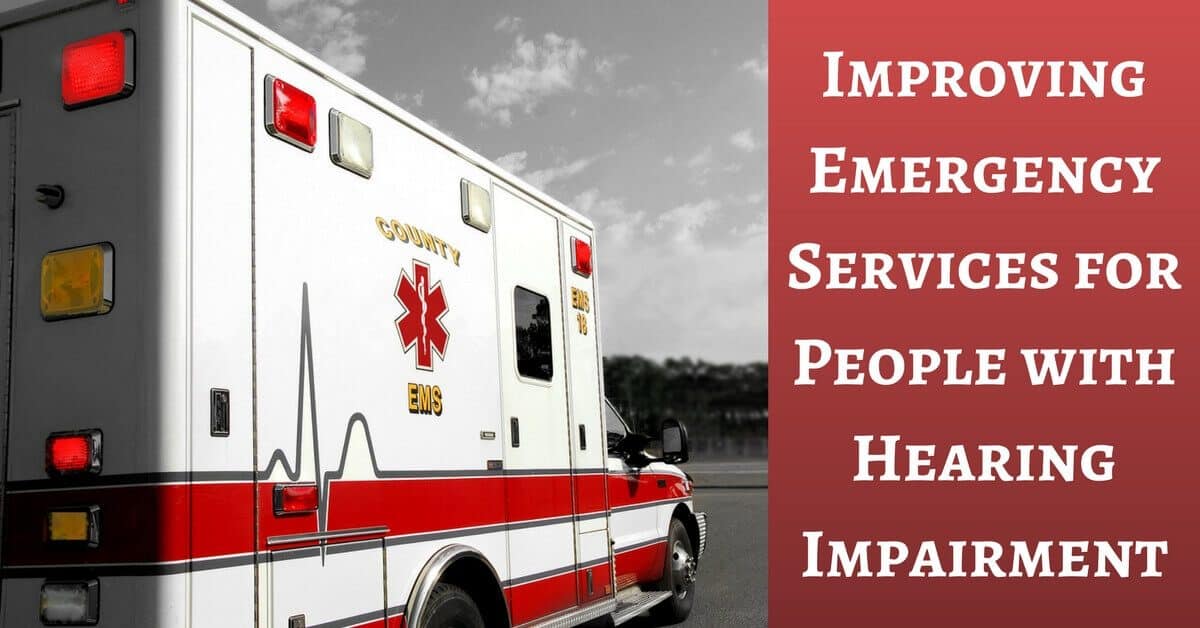Calling 911 should be easy for everyone. Pick up the phone, dial three digits, and get immediate help for your emergency. But for those in the hard of hearing community or those who struggle with hearing loss, calling 911 can be a stressful experience that leaves you feeling helpless.
Accessing Emergency Services
Imagine it’s the middle of the night and your hearing aids are on the bedside table. You wake up and realize your spouse isn’t in bed. You get up to go look for them, and find them on the bathroom floor, unable to get up. You reach for the phone to call for help. But you left your hearing aids in the bedroom and you don’t want to leave your spouse, so you struggle to understand the dispatcher, and make them understand what’s wrong. For the one in five Americans who struggle to hear, being forced to access emergency services over the phone puts lives at risk.
These stats don’t account for other citizens who struggle to communicate on the phone, such as those with speech disabilities, cerebral palsy, or other conditions that prevent easy communication over the phone.
Video Relay Technology
One solution is for those in the deaf and hard of hearing community is to access emergency services through the video relay service. This connects you with a sign language interpreter who will speak to the dispatcher and sign with you in real time. The problem with video relay technology is that this process requires several steps, and in an emergency situation translating endless questions and answers add many minutes to the arrival of professional care.
Equal access is impossible, as Richard Ray, an expert from Los Angeles, is quick to point out. “The average time is anywhere from three to eight minutes before we’re connected to the 911 center” and this is unacceptable. This wait time is far longer than for a hearing person, who’s call is usually connected within 10 seconds! In an emergency, those extra minutes can cost someone their health or even their life.
Lawsuits in New York and Arizona
Because of the difficulties in accessing emergency response services, disabilities rights lawyers and deaf advocates are suing the state, some cities, local governments, and even emergency response services for not complying with the Americans with Disabilities Act (ADA) that requires equal access to 911 for all Americans.
The Proposed Solution: Text-to-911 Technologies
Why are these lawsuits underway today? The answer is the simple solution they want adopted by all emergency services: text-to-911 technologies. With the widespread use of cellphones and other communication technologies, there’s no reason 911 centers can’t be set up to receive and send texts in response to emergency situations. They are fighting for the widespread usage of text-to-911 technologies, which would require call centers to provide texting alternatives for contacting local emergency services. This would ensure that those in the deaf and hard of hearing community won’t have to be dependent on others to access emergency services.
Emergency call centers differ from state to state, with some already using text-to-911 technologies in every center, and other states not providing the service at all. There are approximately 6,000 call centers nationwide, and of these less than 1,000 are equipped to accept or transmit text messages.
Far Reaching Benefits of Emergency Service Improvements
This wouldn’t just benefit the deaf and hard of hearing community, but would make emergency services more accessible in any situation. For example, if someone experiences a stroke and can text but not speak, they would have a way to ask for help. Another instance would be in a situation where it’s not safe to make a phone call, such as an ongoing break in, or during a violent fight.
The lawsuits are applying pressure on both state and federal governments to honor the ADA regulations and adopt texting technology to ensure equal access to all Americans. For more information on this lawsuit, and other concerns for accessing emergency services, visit http://www.motherjones.com/politics/2017/03/text-911-deaf-accessibility-ada-lawsuits-1.
If you suffer from hearing loss, don’t jeopardize your safety or the safety of your loved ones. Visit us at one of our My Hearing Centers locations today to get fitted for a hearing aid and discover solutions for easier communication over the phone so you’ll be prepared for any situation.


